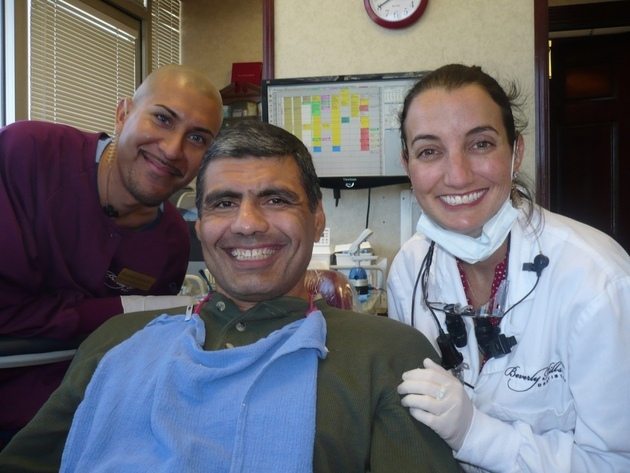
If science is at odds with religion, you won’t find Michele Frawley ’01 taking a side in the fray. Frawley, now a dentist, showed she isn’t torn between what she does and what she believes when she gave free dental care to veterans on November 13, two days after Veterans Day.
Frawley and her family dentistry practice, Beverly Hills Dentistry, joined in Veterans’ Smile Day, an annual event now in its third year, in which dentists nationwide offer free cleaning, fillings and other services to U.S. veterans. More than 300 dentists from all 50 states participated, serving some 2,000 veterans — a huge advance compared to last year, when 80 dentists from six states saw 600 veterans.
To Frawley, the day symbolized the way she has looked at life since her days on the LMU campus. Shaped, she says, by her friendship with Peg Dolan, R.S.H.M., and Cecilia Magladry, C.S.J., and driven by her interest in science, Frawley found an intellectual and spiritual home in college. A member of Beta Beta Beta, a national biology honors society, she led Campus Ministry retreats and was a Eucharistic minister. She even combined her interests in the classroom: Frawley majored in biology and earned a minor in theological studies. “I got those two different points of view, which I think LMU is so good at.”
LMU, as it turns out, hasn’t only shaped Michele Frawley. Her brother, Shawn ’03, is a dentist in the group, and their father, Kevin, a former member of the university’s Board of Regents, started the group. Her sister, Kristen (Frawley) Pomeroy ’05, is in charge of human resources. Early on Nov. 13, the family got to work. In addition to their usual patients, they scheduled 13 veterans for x-rays, cleaning, fillings and even a crown.
The visits that day were not Frawley’s first exposure to veterans’ dental needs. In 2007, she did a residency at a Veterans Administration facility in Salt Lake City, working with former soldiers who had suffered dental damage due to shrapnel or explosions.
Frawley says issues about long-term care and health are why Veteran’s Smile Day was organized in the first place: to bring another element of veterans’ health care to the attention of society’s leaders and lawmakers.
Some veterans do not receive the care they need, she explains, because their service benefits do not qualify them for enough assistance and they can’t afford the services themselves. In addition, she says, there aren’t enough dentists to serve the whole population. “The system can’t handle the need,” she says.
Frawley and her colleagues saw former soldiers who had served in combat from Korea to Afghanistan. Some completed multiple tours of duty, which can impact dental health years later when veterans finally sit down in a dentist’s office.
“Given the conditions [the veterans faced] in combat out in the field, they probably did not have access to care. They get screened before they leave, but some of these guys have done two, three or four tours of duty. When you’re out there, you have no access to care. You might not even have basic care — conditions in which to brush your teeth — [and] nutrition isn’t great. There is a lot of potential of having consequences years later, like having cavities or having to lose teeth.”
For Frawley, the day was almost as rewarding for her as for those who received treatment:
“The veterans are so thankful. It makes me want to tear up just thinking about what they’ve said to me and how cool they think this experience is. That’s great. You don’t get to hear that on a daily basis.”
